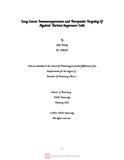Lung cancer immunosuppression and therapeutic targeting of myeloid- derived suppressor cells
Abstract
Myeloid derived suppressor cells or MDSC are immune cells derived from the common myeloid
progenitor which is able to develop erythrocytes , platelets or other granulocytes .They are
separated into two different subsets ; PMN-MDSC and M-MDSC . MDSCs inhibit the immune
system and are involved in tumor maintenance and development. It also impede therapies that use
immunotherapy or other non-immune methods to cure cancer. MDSCs were first identified as
suppressors of T cells, namely CD8+ T-cell responses. The fact that MDSCs have a high number of
immunosuppressive mechanisms does not imply that all of them are active at the same time. The type
of MDSCs that multiplied in response to sickness, as well as the stage of the disease and the site of
suppression, all influence the frequency of a particular immunosuppressive mechanism. MDSCs
will most likely adopt a dominant suppressive mechanism at any one time, which will change as the
disease advances. As a result, evaluating the significance of MDSCs in cancer should entail an
examination of their functional activity as well as one or two chemicals produced by these cells. It
also implies that targeting a single mechanism for therapeutic reasons may be ineffective unless that
mechanism has been determined to be prevalent in the type of cancer being treated.

